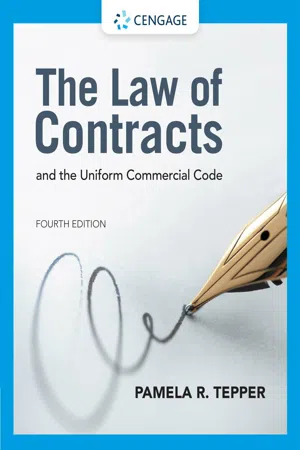Law
Bilateral Contract
A bilateral contract is a legally binding agreement between two parties, where each party makes a promise to the other. In this type of contract, both parties are obligated to fulfill their promises. This stands in contrast to a unilateral contract, where only one party makes a promise and the other party is not obligated to reciprocate.
Written by Perlego with AI-assistance
Related key terms
1 of 5
6 Key excerpts on "Bilateral Contract"
- eBook - ePub
- Jennifer Corrin-Care(Author)
- 2015(Publication Date)
- Routledge-Cavendish(Publisher)
As discussed in Chapter 1, a contract is a legally binding agreement made between two or more people who intend it to have legal effect. There are therefore two elements: an agreement and legal enforceability. This chapter discusses the first element, but is should always be borne in mind that not all agreements are legally enforceable. The other elements required for enforceability are discussed in later chapters. In order to have an agreement, you must have at least two parties. They are commonly called the ‘promisor’ and ‘promisee’. In the case of a unilateral contract, there is only one promisor and the promisee may accept the unilateral offer by taking the requisite action, but he or she is not required to give a promise in return. In the case of a Bilateral Contract, which consists of the mutual exchange of promises, both parties will be ‘promisors’ and ‘promisees’. Which party is being referred to depends on the context in which the words are being used. If the context does not make it clear, alternative terms, referring to the capacity of the parties in the contract, such as ‘vendor’ and ‘purchaser’ or ‘employer’ and ‘employee’, may be preferable. The parties must be of the same mind in order for an enforceable agreement to arise. This is sometimes referred to by using the Latin phrase consensus ad idem, which means ‘concurrence of intention’ or ‘meeting of the minds’. In deciding whether or not there has been a meeting of the minds, the courts adopt an objective approach. In other words, they look at the circumstances surrounding the alleged agreement and, in particular, what the parties have said and done, and ask themselves whether a reasonable person would conclude from that evidence that agreement has been reached. This is as opposed to a subjective approach, which attempts to find out what was present in the minds of the parties - eBook - PDF
Obligations
Law and Language
- Martin Hogg(Author)
- 2017(Publication Date)
- Cambridge University Press(Publisher)
Although such contracts are often styled as ‘unilateral contracts’ in Common law countries, they remain bilateral juridical acts. The so-called ‘unilateral contract’ takes this description because the adjective ‘unilateral’ is being used not to denote the nature of the juristic act but the distribution of the obligational burden under it. This is the second way in which, in some systems, the language of unilater- ality/bilaterality is used. In this usage, the language describes the number of parties to the relationship who come under enforceable duties under it. It should be noted that what is at issue here is purely the number of parties coming under a duty, not whether any such duties are mutual or reciprocal. In this second usage of ‘unilateral’/‘bilateral’, a promise (in the restricted sense of a unilateral promise) is unilateral because it imposes 1 In German Law the concept is called ‘Rechtgeschäft’. 2 It has been a familiar concept in Louisiana and South Africa, but not Scotland, for instance. b juristic acts/obligational burden 131 duties only on the promisor (it is also a unilateral juristic act, of course); marriage is bilateral because duties are accepted by both parties to a marriage (for instance, the duty on each party to support the other financially); and contract may be unilateral or bilateral (or indeed multi- lateral), depending on how many parties to the arrangement come under duties under it. These points are explored more fully below in relation to the various obligations recognised at law, but for the moment what is important to note is the basic point that the language of unilaterality/bilaterality can be used in two very different ways. This is not always made clear in obliga- tional texts or cases. Indeed, mere use of the terms ‘unilateral promise’ or ‘unilateral contract’ fails to convey in which sense the term is being used, or whether it is being used in both senses. Common usage needs to be challenged if clarity is to be achieved. - eBook - ePub
Business Law
A Straightforward Guide
- (Author)
- 2014(Publication Date)
- Straightforward Publishing Digital(Publisher)
Ch. 1
BUSINESS LAW-THE LAW OF CONTRACT
Underpinning all contracts are four main principles:
1) A contract is an agreement between the parties to that contract-one person makes an offer and the other accepts that offer 2) Both parties have an intention to be legally bound by the agreement-this is usually known as an intention to create legal relations3) Parties to the agreement need to be absolutely clear as to the terms of the agreement – this is the main area of contention with contracts, as we will see laterc4) There must be consideration provided by each of the parties to the contract – this means that one person promises to give or deliver and the other promises to pay. The offer and the payment – either monetary or in kind - is the consideration. When making a contract, or entering into a contract all parties to the contract must have the legal capacity to enter into a contract. Very importantly, a contract, in most cases, does not have to be in writing – a piece of paper is not necessary, the agreement and evidence of that agreement forms the basis of contract. There are a few important exceptions, including contracts relating to interests in land (Law of property (Miscellaneous Provisions) Act 1989, s 2(1)) and consumer credit (Consumer Credit Act 1974).Other factors affecting formation include: • Form-the way the contract is created (e.g. the sale of land can only be made in the form of a deed) Form is an issue with specialty contracts but not with simple contracts• Privity of contract and the rights of third parties-generally a contract is only enforceable by or against a party to it, subject to exceptions and certain third party rights are now protected in the Contracts (Rights of Third Parties) Act 1999.The nature of contracts – unilateral and Bilateral Contracts
The majority of contracts entered into are known as Bilateral Contracts. This quite simply means that each party to a contract agrees to take on an obligation. This obligation is underpinned by a promise to give something to the other party. A Unilateral contract will arise where one party to the contract will make a promise to do something (usually to pay a sum of money) if the other party carries out a certain task. Examples of this are where you might undertake to pay someone a sum of money if they shave off their hair for charity or give up smoking. Estate agents enter into unilateral contracts whereby a percentage of sales go to the agent if they sell the property. However, the agent is not legally bound to sell the property, just to try to sell it. - eBook - ePub
Contract Law
A Straightforward Guide
- (Author)
- 2014(Publication Date)
- Straightforward Publishing Digital(Publisher)
4) There must be consideration provided by each of the parties to the contract – this means that one person promises to give or deliver and the other promises to pay. The offer and the payment – either monetary or in kind - is the consideration. When making a contract, or entering into a contract all parties to the contract must have the legal capacity to enter into a contract. Very importantly, a contract, in most cases, does not have to be in writing – a piece of paper is not necessary, the agreement and evidence of that agreement forms the basis of contract. There are a few important exceptions, including contracts relating to interests in land (Law of property (Miscellaneous Provisions) Act 1989, s 2(1)) and consumer credit (Consumer Credit Act 1974). We will outline those contracts that do need to be in writing later on in this chapter. Other factors affecting formation include:• Form-the way the contract is created (e.g. the sale of land can only be made in the form of a deed) Form is an issue with specialty contracts but not with simple contracts• Privity of contract and the rights of third parties-generally a contract is only enforceable by or against a party to it, subject to exceptions and certain third party rights are now protected in the Contracts (Rights of Third Parties) Act 1999.The nature of contracts – unilateral and Bilateral Contracts
The majority of contracts entered into are known as Bilateral Contracts. This quite simply means that each party to a contract agrees to take on an obligation. This obligation is underpinned by a promise to give something to the other party. A unilateral contract will arise where one party to the contract will make a promise to do something (usually to pay a sum of money) if the other party carries out a certain task. Examples of this are where you might undertake to pay someone a sum of money if they shave off their hair for charity or give up smoking. Estate agents enter into unilateral contracts whereby a percentage of sales go to the agent if they sell the property. However, the agent is not legally bound to sell the property, just to try to sell it.The notion of offer and acceptance
As we have seen, for a contract to have legal status, usually one of the parties to the contract must have made an offer and the other party must have accepted the offer. Once the contract is accepted the agreement will be legally binding. The person making the offer is called the offeror and the person to whom the offer is made is known as the offeree. An offer may be express or implied. Express means that there is an express intention to offer goods and for X to pay an amount for the goods. Implied may mean, for example, when purchasing something from a store. The act of taking goods to a checkout means that there is an implied offer to buy those goods. - Pamela Tepper(Author)
- 2021(Publication Date)
- Cengage Learning EMEA(Publisher)
In a Bilateral Contract, the parties exchange a promise for a promise, whereas in a unilateral contract only one party makes a promise, with the other party required to do some act in return. An express contract is one that is specifically stated. It can be oral or written. An implied contract, however, may be one of two types. There is an implied in fact contract, which is inferred from the facts and circumstances of the transaction, or an implied in law contract, which is court created. Contracts may be executed contracts, which are fully performed contracts, or executory contracts, Copyright 2022 Cengage Learning. All Rights Reserved. May not be copied, scanned, or duplicated, in whole or in part. Due to electronic rights, some third party content may be suppressed from the eBook and/or eChapter(s). Editorial review has deemed that any suppressed content does not materially affect the overall learning experience. Cengage Learning reserves the right to remove additional content at any time if subsequent rights restrictions require it. 40 PART I AN INTRODUCTION TO CONTRACTS in which a condition or promise has not been performed by one or all of the parties. Another classification dis- tinguishes void, voidable, and enforceable contracts. A void contract has no legal effect and can never become a contract; whereas a voidable contract can be canceled or avoided by one of the parties. An unenforceable con- tract is one that may have all the elements of a contract, but because of a formality or supervening event, such as the passage of a statute, the contract is unenforceable. The final category is formal and informal contracts, which a formal contract requiring the parties to fulfill certain legal formalities. An informal contract, in contrast, has no special legal requirements.- eBook - PDF
- Richard Mann, Barry Roberts(Authors)
- 2019(Publication Date)
- Cengage Learning EMEA(Publisher)
B’s return promise to A must also be supported by consideration. Thus, in a Bilateral Contract, each promise is the consideration for the other, a relationship that has been referred to as mutuality of obligation. A general con- sequence of mutuality of obligation is that each promisor in a Bilateral Contract must be bound or neither is bound. See C ONSIDERATION IN U NILATERAL AND B ILATERAL C ONTRACTS Type of Contract Offer Acceptance Consideration Unilateral Promise by A Performance of requested act or forbearance by B Promise by A Performance of requested act or forbearance by B Bilateral Promise by A Return promise by B to perform requested act or forbearance Promise by A Return promise by B to perform requested act or forbearance CONCEPT REVIEW 12-1 241 Chapter 12 Consideration Supreme Court of Texas, 2009 302 S.W.3d 299 FACTS American Energy Services (AES or employer) was formed in the summer of 1996. Employees, hired in 1996, allege that in an operational meeting in June 1997, they voiced concerns to John Carnett, a vice president of AES, about the continued viability of the company. The employ- ees allege that, in an effort to provide an incentive for them to stay with the company, Carnett promised the employees, who were at-will employees and therefore free to leave the company at any time, that “in the event of sale or merger of AES, the original [eight] employees remaining with AES at that time would get 5% of the value of any sale or merger of AES.” AES Acquisition, Inc., acquired AES in 2001. Seven of the eight original employees were still with AES at the time of the acquisition. These remaining employees demanded their proceeds, and when the company refused to pay, the employees sued, claiming AES had breached the oral agreement. AES moved for summary judgment on the ground that the agreement was illusory.
Index pages curate the most relevant extracts from our library of academic textbooks. They’ve been created using an in-house natural language model (NLM), each adding context and meaning to key research topics.





